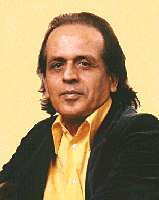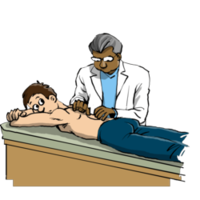Posture
I have long been convinced about the importance of developing a good posture. Not simply the way you walk, sit and stand, but the posture that you adopt emotionally, mentally and spiritually. It is something that goes way beyond attitude and is one of the secrets of the person who is really trying to develop him or herself.
I shall have a lot to say about it in the months to come, and it will be a central theme of a forthcoming book.
Here is a little taste from someone whose work I have admired for a great many years:
“Mental posture is critical and crucial, and everyone can at any time alter his or her standpoint.”
–Sri Raghavan Iyer (Indian-born Prodigy, Rhodes Scholar, Academic, Philosopher, Theosophist, and, from 1965-1986, Professor of Political Science at the University of California, Santa Barbara, and Father of Pico Iyer, 1930-1995)

Non-pharmacological and Lifestyle Approaches to Attention-Deficit/Hyperactivity Disorder: 8. Massage and Manipulation

There is a small but persuasive literature on the value of massage and manipulation in people with attention-deficit hyperactivity disorder (ADHD).
Massage
The first study involved 28 adolescents with ADHD who were given either massage therapy or relaxation therapy for 10 consecutive school days. The massage therapy group, but not the relaxation therapy group, rated themselves as happier and observers rated them as fidgeting less following the sessions. After the 2-week period, their teachers reported more time on task and assigned them lower hyperactivity scores based on classroom behavior.
The second study was a randomized controlled trial involving 30 students aged 7-18 years. The results indicated that therapeutic massage given for 20 minutes twice a week produced significant improvements in both classroom behavior and mood.
There are a large number of studies that have shown that massage therapy can be helpful in managing anxiety in many different situations (1. 2.)
And it may also have some beneficial effects on the immune system.
Manipulation
There has been a great deal of interest in the notion that chiropractic manipulation may have an impact on the symptoms of ADHD.
A small study of seven children diagnosed with ADHD showed some improvements in ratings of hyperactivity.
There are some interesting case reports:
In the first a young girl who had been diagnosed with ADHD whose symptoms had failed to respond to an astonishing array of medications, but who improved once a cervical kyphosis was treated.
The second concerned a nine-year-old with Tourette’s and ADHD who showed a remarkable improvement after a course of chiropractic treatment.
The third concerned an 8-year-old with multiple learning and behavioral disorders associated with ADHD that improved after a course of chiropractic treatment. This case was rather different form the others in that the symptoms began after a fall, and it seems likely that the problems were at least in part due to pain and discomfort, and the child’s improvement may have been related to an improvement in both. The case highlights the importance of remembering that problems with mood, sleep and attention may be secondary to other medical or psychological maladies.
A recent review article on chiropractic care in people with learning disabilities and dyslexia does touch on ADHD and rightly concludes that the evidence so far is interesting but far from conclusive.
There is clearly a great deal of scope for further research into massage and manipulative therapies and ADHD.
I shall keep you posted if any more studies come out.
I am indebted to Dennis da Ponte from Life University in Atlanta for helping track down some of the papers that I referred to in this article.
Body Posture and Memory
“Memory moderates prosperity, decreases adversity, controls youth and delights old age.” –Lactantius Firmianus (Roman Rhetorician often known as the "Christian Cicero,” A.D. 260-340)
The Ancients had many methods for remembering factual details: the best known were methods for associating memories with physical places, the columns in a theater, part of the body or body positions.
There a very interesting new study form Florida State University in Tallahassee that examined the impact on autobiographical memory of assuming the same (congruent) or different (incongruent) postures that the person held during the original event.
Response times were shorter when the subjects’ body positions during memory retrieval of were similar to the body positions in the original events than when the body position was incongruent. Free recall of the autobiographical events two weeks later was also better for congruent-posture than for incongruent-posture memories. This has theoretical implications for the idea of embodied cognition: that the environment plays a role in the formation of cognition, and perhaps also for the two other ideas:
1. That the body can hold memories and
2. Antonio Damasio’s concept of the "somatic marker mechanism" that may provide the neurological mechanism for a crucial psychological concept: theory of mind.
Theory of mind refers to our ability to understand that other people have minds that have desires, beliefs and intentions that are separate form our own. Some experts believe that an inability to fully form a theory of mind underlies some of the problems in autism and schizophrenia.
The fact that specific body postures can be used to improve autobiographic memory may also be one of the mechanisms by which mudras, or symbolic gestures may activate memories and their associated feelings and states of consciousness.
This research follows a study that indicated something that you might already have noticed: positive thoughts are more easily recalled in the upright posture. Slouching tends to make you feel negative and to generate and recall negative thoughts. You may also have noticed how you, or the people around you become more still when they are concentrating on something. Research has shown that when people are successfully engaged in complex cognitive tasks, the normal swaying of their bodies is reduced.
So what are we to make of all this?
If you are trying to recall something that happened to you, adopting the same sort of posture may help your recall. Conversely, some body work to stop you getting into that same position may perhaps lessen recall. And physical stillness may help you focus if you have to engage in a complex cognitive task.
“To a mind that is still, the whole universe surrenders.”
–Chuang Tzu (Chinese Philosopher, c.369-286 B.C.E.)






